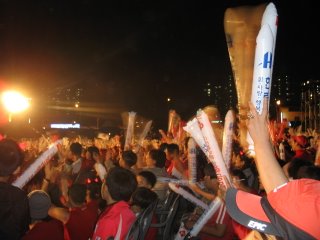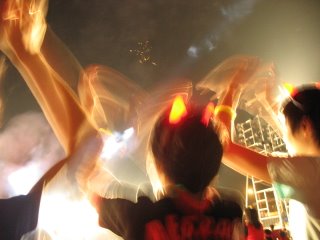


A few nights ago I went to see the Korea vs. Togo World Cup game; It was being broadcast in most public locations: sports bars, billboard screens, the local stadium, and on a huge screen in a large construction site. My friends Tim and Amy accompanied me, and by this enormous department store downtown we met a few Korean friends. One of them, Yung-tek, is one of the nicest people I’ve ever met in my life. He greeted us with gift bags, having bought us each a red “Fighting Korea” T-shirt. I went to put it on over the T-shirt I was already wearing, but Yung-tek insisted that I take off my current T-shirt to put it on. I obliged, and he and his friends proceeded to laugh at my prodigious chest hair. I blushed!
We bought snacks and beer in the department store, a sprawling multi-floor deal that is like Walmart in its “you can buy anything here” approach to retail. Next, we headed over to the construction site, part of a swath of swarming humans, all decked out in red shirts, armbands, headbands, face paint, and glowing devil’s horns. I couldn’t believe my eyes. They had erected a temporary pavilion complete with spotlights, huge balloons, a stage for entertainers, and television cameras. There was maybe a thousand people there, all cheering, chanting, and waving inflatable rods, that, when struck together, make a shallow snare drum sound. When combined, the resulting percussion is considerable.
In between entertainment acts, I somehow became separated from my friends. I looked for them briefly, and then felt that this was a futile activity, so I sat down to enjoy the proceedings. I watched most of the first half from this location, occasionally looking for my friends. Just before the game started, I heard a string of Korean announcements, and I could have sworn that I heard my name and something about Canada. I did not believe my ears though, and so I missed the obvious: my friends had secured a public announcement to try to reconnect with me. At the break, Togo was up 1-0, and I headed to the rear because many people were making their way out of the construction site. There was a bottleneck, so I thought I would have a good chance of finding them there.
I had forgotten my money on my bed, and I didn‘t know the way home, so I would have had to find a bank before I caught a cab. All of a sudden, through the loudspeaker I can hear my friend Tim’s voice say in English “Trevor, if you can hear me, meet Tim at the camera between the two towers.” I was thrilled; as I was hungry and thirsty and they had all the snacks I could alleviate my bodily discomfort and enjoy the rest of the game with good company. Korea scored two goals in the second half, and every time they scored, they fired off fireworks and people got up out of their seats, hollered, hugged each other, and slapped each other high fives. We went out for drinks after Korea won 2-0 to the jubilation of the people.















